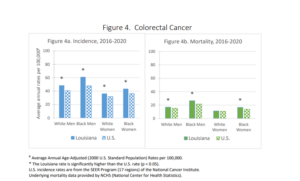Over the past few years, countless research papers, articles and medical journals have highlighted a rise in colorectal cancer diagnoses in younger adults, those under 50. According to the American Cancer Society (ACS), this trend has rapidly increased since the 1990s. Not only are younger adults being diagnosed, ACS says, but more are also dying from the disease.
In its yearly cancer report, released earlier this year, ACS notes that colorectal cancer was the fourth leading cause of cancer death in both men and women under 50 in the 1990s. More than three decades later, colorectal cancer is the leading cause of cancer death in men of this age group, and second for women younger than 50.
What are you personally seeing as it relates to colorectal cancer and younger adults (20s, 30s, 40s)? What are your biggest concerns with this trend?
We are certainly seeing an increased incidence of colorectal cancer in young patients, and have been for several years. Now that it has become more common, I think more people are taking notice. However, we are still not sure what to attribute this to.
Ongoing research will hopefully help determine what is causing this so we can try to reverse the trend. We are certainly concerned about environmental exposures and changing diets contributing to this.
That being said my biggest concern is that often patients in younger age groups have their symptoms attributed to IBS or other benign diseases which leads to these cancers being found at later stages because the invasive workup is generally reserved for older patients previously thought to be higher risk.
At least one study has identified signs that may be common in people who develop early-onset colorectal cancer, including diarrhea, rectal bleeding, abdominal pain and iron-deficiency anemia.[1]
Is Louisiana’s younger population at higher risk compared to other states?
Again, this is a question that we do not have a clear answer to. Certainly, Louisiana has one of the highest rates of obesity in the nation which generally translates in to a poor diet and less exercise — both of which are leading risk factors for the development of colorectal cancer.

It’s worth noting, in general, incidence rates for colorectal cancer in Louisiana are well above the national average for both men and women, and have been for several years.
Though the rise in cases in patients younger than 50 is largely unexplained, are there any risk factors (or genetic predisposition) that you believe are playing a role in these diagnoses? Are there any steps younger people should be taking to curb their risk?
In general, routinely exercising and maintaining a balanced diet are great steps anyone can take to reduce their risk of developing cancer. Losing weight can go a long way in lowering your risk.
The American Cancer Society notes that 1 in 3 people diagnosed with colorectal cancer before 50 have a family history of the disease or a genetic predisposition. For those with a family history, keeping up to date with annual screenings, once eligible, is an important step in helping to potentially catch signs of the disease as early as possible.
Do you feel the screening guidelines for colorectal cancer need to be modified?
Overall, I feel that colon cancer screening is so safe that any symptoms should be investigated early. I do applaud the efforts to move colorectal cancer screening to age 45, but unfortunately, even though guidelines have suggested this, some insurance companies take a long time to adopt them, and thus implementation is often difficult.
Though the trend for younger patients with colorectal cancer is increasing, it is certainly not the norm and so screening test benefits have to be weighed against screening test risk. That being said, patients need to advocate for themselves, and if they notice any change in bowel habits, bleeding, or other concerning findings they should certainly have those symptoms investigated quickly, and if they feel their concerns are not being addressed, perhaps seek a second opinion concerning their care.
Through Mary Bird Perkins’ innovative Prevention on the Go program, at-home colorectal cancer screening kits are available at no cost. To view all upcoming screening events and to make an appointment, visit marybird.org/get-screened.
Current screening guidelines for colorectal cancer:
Beginning at age 45, men and women should begin screening with one of the examination schedules below:
- A colonoscopy every 10 years.
- A flexible sigmoidoscopy (FSIG) every 5 years*
- A double-contrast barium enema every 5 years*
- CT Colonography (virtual colonoscopy) every 5 years*
- An at-home, multiple sample Guaiac-based fecal occult blood test (gFOBT) or fecal immunochemical test (FIT) every year*
- Stool DNA (sDNA), every 3 years*
*Colonoscopy should be done if test results are positive.
[1] https://www.cancer.gov/news-events/cancer-currents-blog/2023/colorectal-cancer-young-people-warning-signs

